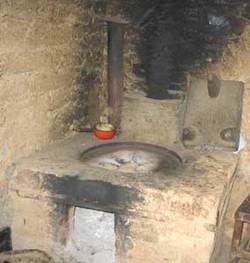TCU students spent spring break building stoves in Guanajuato, México
 |
| Shown here is a typical oven in Guanajuato, before a lorena is put in. |
Fort Worth, TX
3/9/2007
Ten TCU students will visit Mexico over spring break, but not the beautiful and touristy Cancun or Mazatlan that everyone is familiar with, rather they are heading to Guanajuato, Mexico for a different spring break experience. They will be going there for a service-learning project that will help the rural community, along with one TCU faculty member and two TCU staff members. Their experiences will be documented online through diaries, which will be updated daily from March 12-16 on TCU’s Web site www.tcu.edu.
Spring Break in Guanajuato
Videos from Guanajuato
TCU has sponsored Alternate Spring Breaks (ASB) for several years around the country; this is the third year for an ASB program outside of the U.S. The purpose of the trips has been to provide community service, including building adobe houses in rural communities in Mexico. The program is a collaboration between TCU’s Department of Social Work and the Center for Community Involvement and Service-Learning.
This year they will be building stoves, called “lorenas” in Spanish - which comes from the Spanish words for mud (lodo) and sand (arena). They will be building lorenas for seven families living in the rural community of Hacienda de Arriba, located in the mountains outside the city of Guanajuato. The stove building, involving a step-by-step process, takes over two days. Currently, their kitchens have no chimneys and the wood fire gives off smoke, causing the walls to become blackened with soot.
Lorena stoves have great societal and environmental benefits. In addition, it is cultural tradition for women to do most of the cooking. Concerning women’s health, the stove reduces the inhalation of smoke and tar from the burning wood, lowering the risk of developing emphysema or lung cancer. It also reduces the constant eye irritation caused by a typical stove’s fumes. The lorena stove cuts down on the time needed to cook, leaving the women more time for themselves and their families.
Environmentally, the lorena stove cuts the amount of firewood needed in half, helping conserve the region’s resources. The stove can also be fueled with the fallen bark of eucalyptus trees, sawdust, or the roots and leftovers of the pumpkin, corn, or bean harvests. The lorena stove is recommended for communities where wood is scarce. The basic design of the stove is very old and has existed in many varied types, materials and shapes.
Hunter Shelburne, political science and Spanish senior, who has spent his last two spring breaks in Guanajuato, plans on continuing working on sustainable community projects both in Mexico and the U.S. after graduation. “I hope this trip is as amazing as the last two have been,” said Hunter. “Each year, we’ve had the opportunity to expand our contacts and program. I hope the trip exposes students to unique life-change experiences and acts as a force of positive change for everyone involved.”
Guanajuato, which which coincidentally means “hill of the frogs” in Spanish, was named by in the the Purepecha Indians who inhabited the area and believed that the mountains surrounding the area resembled frogs. Guanajuato has been very receptive to TCU’s current and prior academic and service-oriented endeavors and has recognized TCU as an innovator of service-learning programs in the city.
“Many people have commended TCU for starting a program that works with and gives back to the host community,” said Tracy Dietz, TCU social work professor and coordinator of the project. “We have been told we are the first to come and give back. We are proud to continue this tradition of service and learning in Mexico which began in 1998.”
-30-
Media contact:
Shawn Kornegay
Asst. director of communications
817-257-5061
s.kornegay@tcu.edu
Shawn Kornegay
Asst. director of communications
817-257-5061
s.kornegay@tcu.edu










